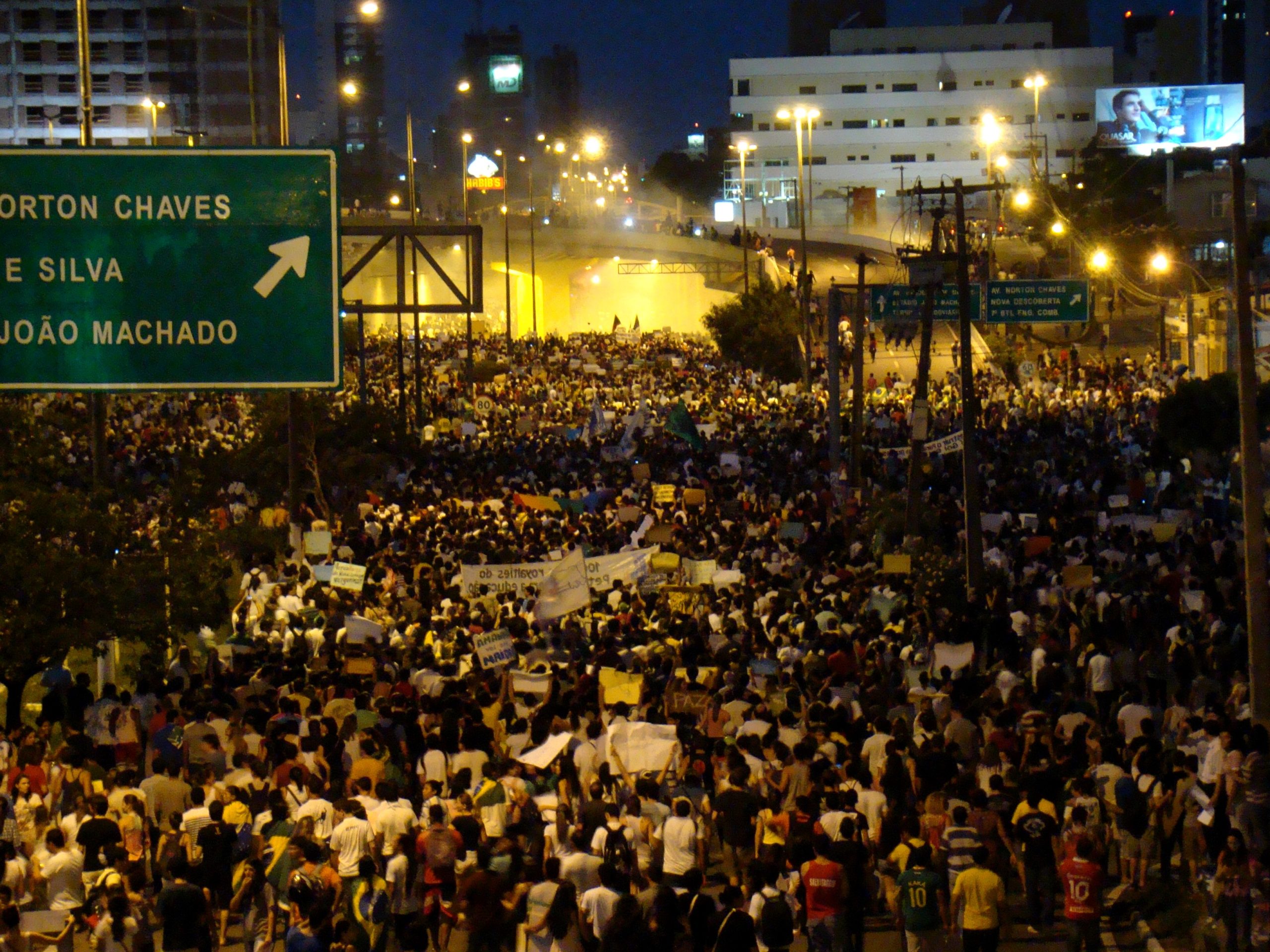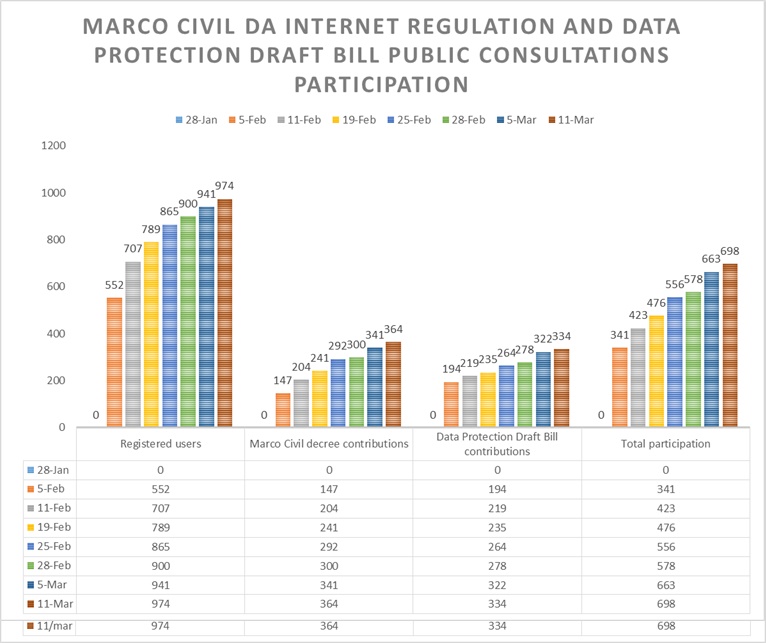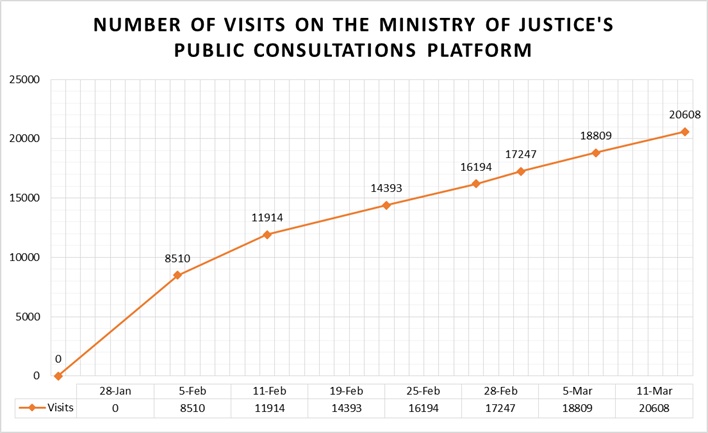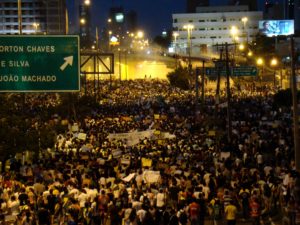
InternetLab Reports – Public Consultations No. 07
This is the seventh InternetLab newsletter about the Brazilian public consultations about the Marco Civil da Internet regulation and the Data Protection Draft Bill, organized by the Ministry of Justice. Check the numbers, statistics and hot topics of this week.
Numbers and statistics

Source: Ministry of Justice.

Marco Civil da Internet: Network neutrality and active prioritization
Danielle Coffey, vice-president of the Telecommunications Industry Association (TIA), submitted a contribution on behalf of the association suggesting that company services should be exempted from net neutrality regulations.
According to her, this exemption would address the balance between the need for an open and neutral internet and the call for protecting different industry business models. Coffey also points out that companies have a bargaining power to negotiate plans with ISPs, being able to contract customized services that best fit their needs. As these customized services may often involve traffic discrimination, Coffey claims that such services should be considered an exception of the net neutrality rule.
TIA’s contribution rais two important concerns: how active prioritization practices must be addressed in light of net neutrality, and what is the scope and meaning of the term “internet” under Marco Civil’s net neutrality regime.
In his contribution to the public consultation, Pedro Ramos (an InternetLab fellow researcher) presents an overview about how active priorization practices should be addressed. According to Ramos, the limitations imposed by a net neutrality rule should not be applied to local and private networks deployed by companies (or domestic users). In other words, the decision about discriminating or not certain data packets within a private network would not per se violate necessarily a net neutrality rule.
However, as Ramos argues, active prioritization should not be imposed by the ISPs to users nor be offered as a sine qua non condition for contracting internet provision services. If these premises are not observed, these business frameworks may become “fast lanes” where access to certain applications would have higher QoS standards than other applications, a practice that would probably hurt net neutrality regulation.
Regarding the discussion about wheter non-discrimination obligations should also be extended to private networks (including intranets and extranets), we need to take a step back and understand what is the concept of internet and how it affects net neutrality. Ramos has the following view on the subject:
Commentary: Pedro Ramos (InternetLab fellow researcher and Master of Laws candidate at FGV-SP)
The discussion on the concept of “what is Internet ” is very relevant to net neutrality. Rules that aim to foster innovation and promote an open internet generally do not cover other telecommunication services and value-added services, which are beyond the concept of internet and, therefore, are governed by other statutes and principles. In US law, the concept of internet was first defined in 1998 by the Internet Tax Freedom Act, which defines Internet as “the myriad of computer and telecommunications facilities, including equipment and operating software, Which Comprise the interconnected world-wide network of networks que employ the Transmission Control Protocol / Internet Protocol, or any successor or predecessor protocols to such protocol, to communicate information of all kinds 103 by wire or radio. ” In Brazil, the first legal definition appears in 1995 by Rule n. 004/1995, published by the Ministry of Communications (approved by Order no. 148/1995 of the Ministry of Science and Technology), which provides that internet is the “generic name that designates the myriad of networks, the means of transmission and switching, routers, equipment and protocols necessary to provide communication between computers, software and data contained in these computers. ” This imprecise definition was improved with Marco Civil, which provides that internet is “the system that covers the myriad of logical protocols, structured on a global scale for public and unrestricted access, in order to enable data communication between terminals by and through different networks.
This difficult definition of what is “Internet” made popular the adoption of the term “public internet” referring to the World Wide Web, in contrast of private networks, offered in logic or structural separation from the rest of the Internet.
Personal data: treatment of personal data for law enforcement purposes
Many users of the public consultation platform have raised doubts about the Article 4 of the Data Protection Draft Bill.
Article 4 The processing of personal data for the sole purpose of public security, defense, State security, investigation activities and prosecution of criminal offenses will be governed by specific legislation, without prejudice to the application of the general principles set forth herein . [free translation]
Participants argued that there would be no need to address these issues in a specific statute, since the scope of the Draft Bill is to regulate protection of personal data generally. Some argued that the Article should not raise uncertainty that may lead to a relativization of the safeguards set forth in the Draf Bill, since such safeguards are also intended to protect citzen also fromof the state power abuses.
The choice of not addressing these cases under the Draft Bill hood might reflect different positions. Among them, we can list the burden of prediciting what kind of public safety situations may legimitate the bypass of such rules and the pollitical obstacles around the approval of such rule, which could be even higher in Congress.

The concerns of the participants have concrete connections with the current Brazilian political situation, specially if we take a look at protests and political demonstrations which are mushrooming around the country. The reason is that it is common that the State approach over street demonstrations like these is through by public security policies. The relevance of such discussion to the protection of legitimate social movements were addressed by Marta Kanashiro in her comment:
“This articles gives room to a loophole that may empower abuse of rights and may lead to adverse consequences regarding the criminalization of social movements“.
The tension between social movements and public security agencies should be treated carefully as possible abuses in data treatment may ultimately undermine freedom of expression.
Authors: Francisco Brito Cruz and Jonas Coelho Marchezan.